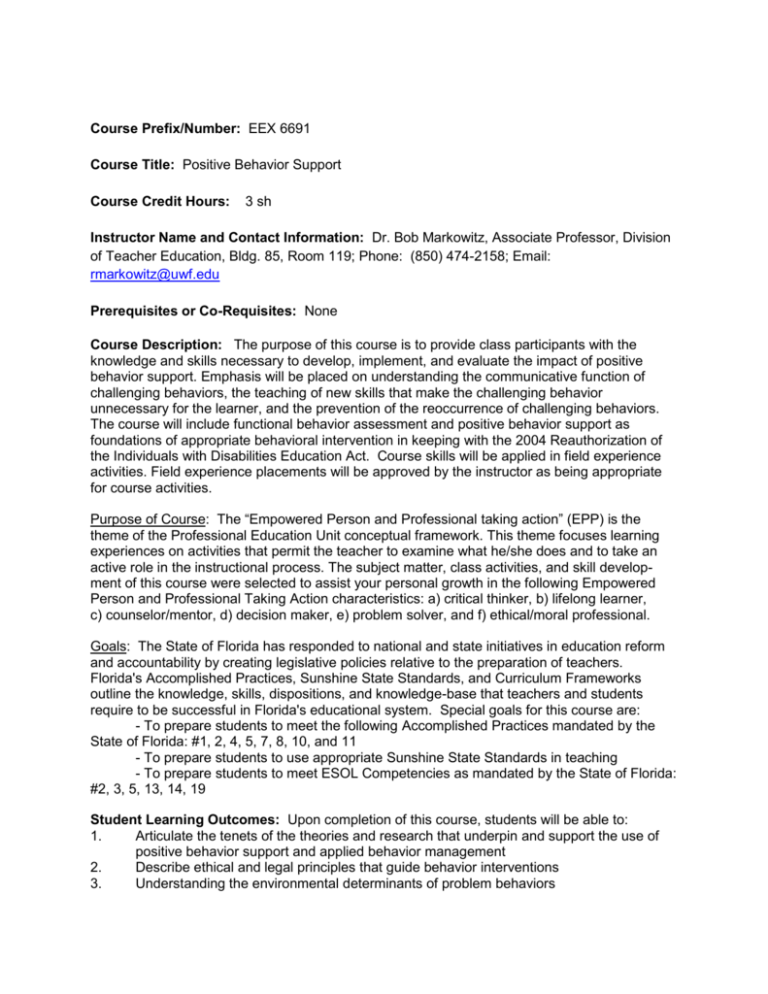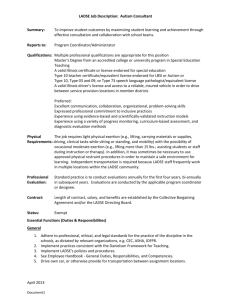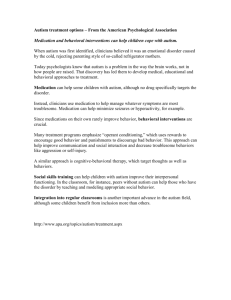Course Prefix/Number: EEX 6691
advertisement

Course Prefix/Number: EEX 6691 Course Title: Positive Behavior Support Course Credit Hours: 3 sh Instructor Name and Contact Information: Dr. Bob Markowitz, Associate Professor, Division of Teacher Education, Bldg. 85, Room 119; Phone: (850) 474-2158; Email: rmarkowitz@uwf.edu Prerequisites or Co-Requisites: None Course Description: The purpose of this course is to provide class participants with the knowledge and skills necessary to develop, implement, and evaluate the impact of positive behavior support. Emphasis will be placed on understanding the communicative function of challenging behaviors, the teaching of new skills that make the challenging behavior unnecessary for the learner, and the prevention of the reoccurrence of challenging behaviors. The course will include functional behavior assessment and positive behavior support as foundations of appropriate behavioral intervention in keeping with the 2004 Reauthorization of the Individuals with Disabilities Education Act. Course skills will be applied in field experience activities. Field experience placements will be approved by the instructor as being appropriate for course activities. Purpose of Course: The “Empowered Person and Professional taking action” (EPP) is the theme of the Professional Education Unit conceptual framework. This theme focuses learning experiences on activities that permit the teacher to examine what he/she does and to take an active role in the instructional process. The subject matter, class activities, and skill development of this course were selected to assist your personal growth in the following Empowered Person and Professional Taking Action characteristics: a) critical thinker, b) lifelong learner, c) counselor/mentor, d) decision maker, e) problem solver, and f) ethical/moral professional. Goals: The State of Florida has responded to national and state initiatives in education reform and accountability by creating legislative policies relative to the preparation of teachers. Florida's Accomplished Practices, Sunshine State Standards, and Curriculum Frameworks outline the knowledge, skills, dispositions, and knowledge-base that teachers and students require to be successful in Florida's educational system. Special goals for this course are: - To prepare students to meet the following Accomplished Practices mandated by the State of Florida: #1, 2, 4, 5, 7, 8, 10, and 11 - To prepare students to use appropriate Sunshine State Standards in teaching - To prepare students to meet ESOL Competencies as mandated by the State of Florida: #2, 3, 5, 13, 14, 19 Student Learning Outcomes: Upon completion of this course, students will be able to: 1. Articulate the tenets of the theories and research that underpin and support the use of positive behavior support and applied behavior management 2. Describe ethical and legal principles that guide behavior interventions 3. Understanding the environmental determinants of problem behaviors 4. 5. 6. 7. Describe and demonstrate strategies for measuring behavior change, conducting a functional behavioral assessment, and developing behavior support strategies Describe and demonstrate strategies for teaching and encouraging the development of social, communicative, and alternative skills Collaborate with others, including family members, to implement behavioral interventions that support students displaying disruptive behaviors in school and community settings. Describe environmental, instructional, and behavioral management practices that support the engagement and learning of the student with autism within classrooms. Topics Covered: Behavioral theory / applied behavior analysis / social learning theory History of behavior intervention and positive behavior support Examining PBS Framework Evidence-base of Positive Behavior Support Procedural safe guards mandated by Section 504 and IDEA Ethical principles to consider when selecting behavioral interventions Professional ethics involved in behavior management Autism symptoms and behavior challenges Four term contingency and challenging behavior Functional nature of challenging behavior Strategies for conducting a functional behavioral assessment Observing behavior (anecdotal, ABC approaches, counting frequency, duration, occurrence, latency, etc.) Recording and reporting observations (using technology to graph and display data) Analyzing observational data Collecting and analyzing informal and formal social, communication, and academic data to inform the functional assessment process Interview strategies Developing hypotheses for the function of challenging behavior Development of individualized behavior support plans Implementation of positive behavioral supports Instruction of alternative social, communication, and behavior skills for students with autism Strategies for supporting peer social interaction and the development of pro-social skills Communicating with parents and professionals about behavior challenges Collaborative development of behavior support plans Supporting families in addressing home and community concerns Environmental classroom supports and visual strategies Classroom structure including adult roles, physical arrangement, and instructional materials Classroom management strategies for support of individual and group appropriate behavior Required Readings: Bambara, L., & Kern, L. (2005) Individualized supports for students with problem behaviors. New York, NY: Guilford Publications. Brown, K. E., & Mirenda, P. (2006). Contingency mapping: Use of a novel visual support strategy as an adjunct to functional equivalence training. Journal of Positive Behavior Interventions, 8, 155-164. Carr, E. G., Dunlap, G., Horner, R. H., Koegel, R. L., Turnbull, A. P., Sailor, W., et al. (2002). Positive behavior support: Evolution of an applied science. Journal of Positive Behavior Interventions, 4, 4-16, 20. Delano, M. & Snell, M. E. (2006). the effects of social stories on the social engagement of children with autism. Journal of Positive Behavior Interventions, 8, 29-42. Dunlap, G., & Fox, L. (1999). A demonstration of behavioral support for young children with autism. Journal of Positive Behavior Interventions, 1, 77-87. Durand, V. M. & Merges, E. (2001). Functional communication training: A contemporary behavior analytic intervention for problem behaviors. Focus on Autism and Other Developmental Disabilities, 16, 110-119. Heflin, L. J., & Alberto, P. A. (2001). Establishing a behavioral context for learning for students with autism. Focus on Autism and Other Developmental Disabilities, 16, 93-101. Horner, R.H., & Carr, E.G. (1997). Behavioral support for students with severe disabilities: Functional assessment and comprehensive intervention. Journal of Special Education, 31, 84-104. Horner, R. H., Carr, E. G., Strain, P. S., Todd, A. W., & Reed, H. K. (2002). Problem behavior interventions for young children with autism: A research synthesis. Journal of Autism and Developmental Disorders, 32, 423-446. Jensen, C. J., McConnachie, G., & Pierson, T. (2001). Long term multi-component intervention to reduce severe problem behavior: A 63-month evaluation. Journal of Positive Behavior Interventions, 3, 225-236 Johnston, S. S., & O’Neill, R. E. (2001). Searching for effectiveness and efficiency in conducting functional assessments: A review and proposed process for teachers and other practitioners. Focus on Autism and Developmental Disabilities, 16, 205-214. Moes, D. R., & Frea, W. D. (2000). Using family context to inform treatment planning for the treatment of a child with autism. Journal of Positive Behavior Interventions, 2, 40-46. Morrison, L., Kamps, D., Garcia, J., & Parker, D. (2001). Peer mediation and monitoring strategies to improve initiations and social skills for students with autism. Journal of Positive Behavior Interventions, 3, 237-250. Snell, M. E. (2002). Strengthening the focus on problem contexts. Journal of Positive Behavior Interventions, 4, 21-24. Recommended Resources/Supplemental Readings: Bambara, L. M., & Knoster, T. (1998). Designing Positive Behavior Support Plans. Innovations # 13. Washington, DC: American Association on Mental Retardation. Bambara, L., Dunlap, G., & Schwartz, I. (Eds.)(2004). Positive Behavior Support: Critical articles on improving practice for individuals with severe disabilities. Pro-Ed and TASH. Demchak, M. & Bossert, K.W. (1996). Assessing problem behaviors. Innovations #4. Washington, DC: American Association on Mental Retardation Horner, R.H., Dunlap, G., Koegel, R.L., Carr, E.G., Sailor, W., Anderson, J.A., Albin, R.W., & O’Neill, R.E. (1990). Toward a technology of nonaversive behavioral support. Journal of the Association for Persons with Severe Handicaps, 15, 125-132. Horner, R. H., Carr, E. G., Strain, P. S., Todd, A. W., & Reed, H. K. (2002). Problem behavior interventions for young children with autism: A research synthesis. Journal of Autism and Developmental Disorders, 32, 423-446. Janzen, J. E. (2003). Understanding the nature of autism: A guide to the autism spectrum disorders. San Antonio, Texas: PyschCorp. Koegel, L. K., Steibel, D., & Koegel, R. L. (1998). Reducing aggression in children with autism toward infant or toddler siblings. Journal of the Association for Persons with Severe Handicaps, 23, 111-118. National Research Council (2001). Educating children with autism. Committee on Educational Interventions for Children with Autism. Division of Behavioral and Social Sciences and Education. Washington, DC: National Academy Press. Grading / Evaluation: Application Activity Synthesis Test Field Experience Portfolio 50 pts. 50 pts. 100 pts. [Note to instructor—Each instructor may determine and insert the appropriate strategies/assignments/experiences to assess student achievement in this course. However, the field experience assignment(s) must be implemented as written herein in order to ensure that endorsement requirements are met through this course]. It is important to realize that an on-line course requires the same amount of time as a course taken on campus. It is typically advised that a course should have 45 hours of work for each credit hour. This means that this coursework should take 13.5 hours of your time each week. Of course, the actual amount of time will vary depending on your learning style, previous knowledge, the complexity of the topic, and the site used for field work. 1. 2. 3. Each class session will include an application activity that must be completed by the student and submitted to the instructor for grading. Application activities will constitute 25% of the course grade and are worth 50 points (5 points for each). A synthesis test of application questions will comprise the final exam and assess the student’s ability to apply the content of the course to case studies and classroom scenarios. The test will constitute 25% of the course grade (50 points). Field Experience Portfolio. Students will complete a field experience portfolio that documents 15 hours of field practicum experience and the ability to apply the following professional practices: conduct a functional assessment interview; collect observational data; develop a behavior hypothesis; design a behavior support plan; and design an instructional plan for alternative skills. The portfolio must include the following: a. b. c. d. e. Activity log Focus individual description A walk in his/her shoes essay Completed functional assessment interview with caregiver or educator Observation cards or data collection forms that represent observations on 3 separate occasions f. Proposed behavior support plan that includes: behavior hypothesis, antecedent interventions; alternative skills; and responses to problem behavior g. Proposed instructional plan for teaching alternative skill(s) The portfolio will constitute 50% (100 points) of the student’s grade. Scoring Rubric for Application Activities 1 point 2 points 3 points 4 points 5 points Answer is incorrect, but the student has responded to the question. Students seems to be drawing upon own perceptions and experiences and is not utilizing content presented in course to respond. Answer is ambiguous. Student has not used course content to completely address question. Answer is correct, however there is missing information or the student has not addressed the question completely. Answer is correct, however the response does not address the question succinctly using content from course readings and lecture. Answer is complete, succinct, and accurate. Answer shows evidence that student has integrated content from course readings and lecture. Scoring for Portfolio 100 points – All elements present, portfolio well organized, no spelling or grammatical errors, each element reflects good understanding of the activity and thoughtful responses, student shows mastery of the concepts in application to the field experience. Point loss -10 points for each missing element -5 points for grammatical or spelling errors -5 points for disorganization -2 points for each error (e.g., hypothesis not developed on functional assessment; plan missing components; instructional plan incomplete) Grading Scale - Grades will be determined based on the following scale: A = 90% - 100% (180 – 200 points) B = 80% - 89% (160 – 179 points) C = 70% - 79% (140 – 159 points) D = 65% - 69% (130 – 139 points) F = below 65% (129 or less points) No grade below “C” will be accepted toward a graduate degree. This includes Cgrades. Expectations for Academic Conduct/Plagiarism Policy: As members of the University of West Florida, we commit ourselves to honesty. As we strive for excellence in performance, integrity—personal and institutional—is our most precious asset. Honesty in our academic work is vital, and we will not knowingly act in ways which erode that integrity. Accordingly, we pledge not to cheat, nor to tolerate cheating, nor to plagiarize the work of others. We pledge to share community resources in ways that are responsible and that comply with established policies of fairness. Cooperation and competition are means to high achievement and are encouraged. Indeed, cooperation is expected unless our directive is to individual performance. We will compete constructively and professionally for the purpose of stimulating high performance standards. Finally, we accept adherence to this set of expectations for academic conduct as a condition of membership in the UWF academic community. The Student Code of Conduct sets forth the rules, regulations and expected behavior of students enrolled at the University of West Florida. Violations of any rules, regulations, or behavioral expectations may result in a charge of violating the Student Code of Conduct. It is the student’s responsibility to read the Student Code of Conduct and conduct himself/herself accordingly. You may access the current Student Code of Conduct at http://www.uwf.edu/judicialaffairs. Assistance: Students with a documented disability who require specific examination or course related academic accommodations should contact the Student Disability Resource Center (SDRC) by email at sdrc@uwf.edu or by phone at 850.474.2387.







